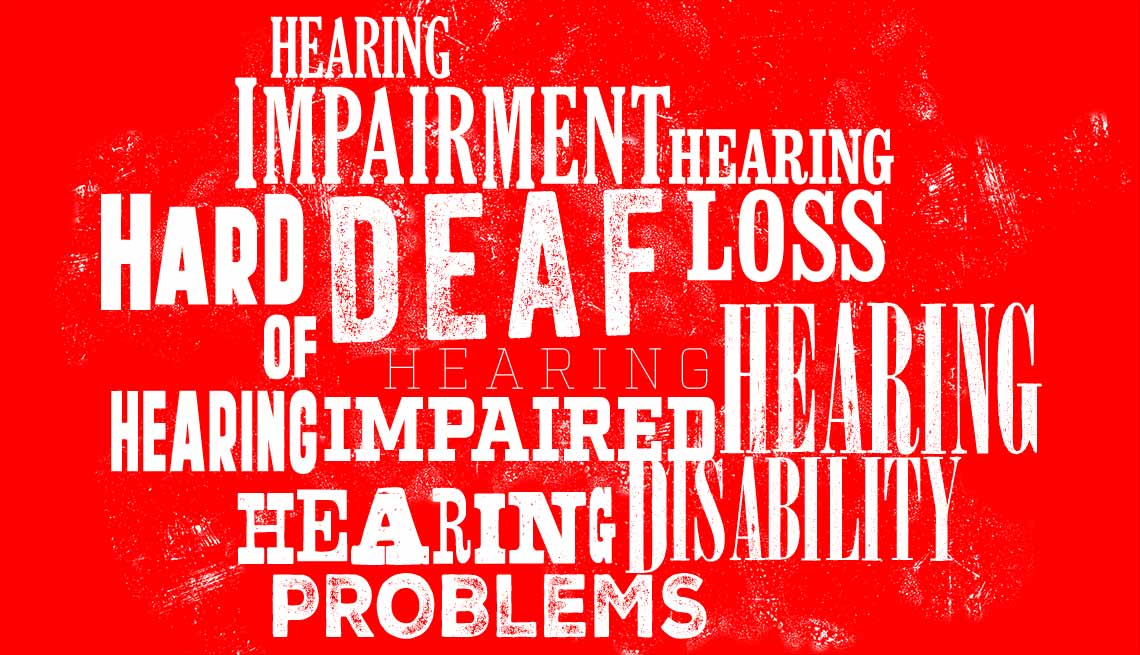Say That Again Every Day Sounds and Hearing Loss

Scott Davis/AARP
The contend over how to refer to those with hearing loss.
Recently, the headline for one of my columns used the term "the hearing impaired" to refer to people with hearing loss. As soon every bit I saw it, I knew there would be protests. The debate over what exactly to call people with hearing problems has raged for years.
Should we employ the quondam-fashioned-sounding term "hard of hearing"? Or refer to the "hearing disabled"? Or maybe the cumbersome "people with hearing loss"? Even some of the major hearing associations can't decide. The National Association for the Deaf, for example, is OK with the use of "difficult of hearing," while the Hearing Loss Association of America recommends "people with hearing loss."
As for the headline — which was inverse — calling a group "the hearing impaired" suggests that the hearing disability defines the person. Many of those with hearing loss concur that it's fine to describe a person every bit having a hearing impairment simply not to use "the hearing impaired" to describe a category of people. For the aforementioned reason, many people with diabetes don't want to exist called "diabetics."
The emails nosotros received from those unhappy with the headline touched on this and other points.
The AARP fact checker for my column, who was born with hearing loss, pointed out that the Merriam-Webster lexicon defines "impaired" as "beingness in a less than perfect or whole status: as disabled or functionally defective."
"Contrary to the definition, I believe that I am both whole and unable to hear," she wrote in an email.
Several AARP readers with hearing loss had similar comments: "If I tell people that I am hearing impaired, they think something is wrong with me. Nevertheless, if I tell people I am deaf, they say nothing is wrong with me except that I tin can't hear," wrote one.
But others saw it differently. "I don't run into why someone would object to the phrase, 'hearing impaired,' because that is what it is," i reader emailed. "If they want to hide their disability, then why should they feel any entitlement to better services?"
On the other hand, many hearing-health professionals blithely and frequently use the term "hearing impaired." And people with vision loss routinely use the term "vision dumb." Go figure.
So what exactly do we call ourselves?
People with hearing loss
The but term that seems to be accustomed past everyone is "people with hearing loss." In that location are two bug with that phrase: Information technology's cumbersome and it has no easy singular. I don't call up many people would say, "I am a person with hearing loss." Y'all might say, "I accept a hearing loss," or, as I often do, "I have a hearing damage."
However, a number of national organizations have chosen to shift away from using hearing loss altogether in favor of more positive language. The Hearing Association of New Zealand began as the League for Hard of Hearing. Amend Hearing Australia avoids any suggestion of disability. Great britain's Royal National Institute for Deafened People (RNID), founded in 1911, changed its name 100 years afterward to Action on Hearing Loss.
Difficult of hearing
Several hearing associations, including the Canadian Hard of Hearing Association (CHHA) and the International Federation of Difficult of Hearing People (IFHOH), use this term. The Hearing Loss Association of America was originally called Self Help for Difficult of Hearing People, or SHHH. These days "difficult of hearing" sounds former-fashioned.
Deaf
I frequently use this in casual conversation, simply not in my writing, because in fact I am profoundly deaf in one ear and have limited hearing in the other. Equally I said in my volume, Shouting Won't Assistance, the term "deaf" is politically incorrect for someone similar me, but I yet like to use it. It's blunt and sassy. It'south a mode to talk back to my hearing loss.
Having disabilities, but not disabled
"People with disabilities" is the preferred term considering it refers to people as people, non as their inability. Simply even some advocacy organizations use "disabled." The newspaper Able describes itself equally a paper "positively for, past and almost the Disabled." Disabled American Veterans has held onto its proper name despite the plow in fashion. Merely consider that the act that protects people with disabilities is called the Americans With Disabilities Human action, non the Disabled Americans Act.
The betoken, advises the disability advancement group Mobility International USA, is to "put people kickoff." The grouping urges using positive language that avoids referring to people with disabilities equally "the disabled, the bullheaded, the epileptics, a quadriplegic," etc. "It is fine to say 'person with a disability,' but terms like 'challenged' and 'the disabled' have fallen out of favor." When in uncertainty about what term to use, ask.
In other words, people with disabilities, including hearing loss, want to be recognized considering they desire equal access, just that doesn't mean they want to be defined by their disability. When thinking about the language of disability, keep those principles in listen.
blountsieneat1998.blogspot.com
Source: https://www.aarp.org/health/conditions-treatments/info-2016/deaf-disabled-hearing-loss-kb.html
0 Response to "Say That Again Every Day Sounds and Hearing Loss"
Post a Comment